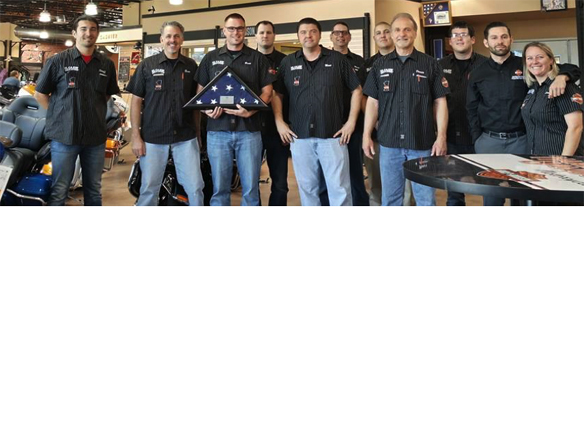“Less than 0.5 percent of the [U.S.] population serves in the armed forces…”Eikenberry and Kennedy in the New York Times on 26 May 2013
“Less than 0.5 percent of the [U.S.] population serves in the armed forces…”Eikenberry and Kennedy in the New York Times on 26 May 2013
Three young vets from that one-half of one percent of our nation are making a difference in our community, providing the business world, as well as our nation, proven skills, qualities, and traits. Like all of their fellow vets, their characters were forged by hard earned achievement meeting or surpassing uncompromising standards. In some cases, perseverance was forged by incredible accomplishments in the face of adversity unimaginable to the majority of their fellow citizens. Similar to the World War II veterans, dubbed America’s greatest generation, they are making a difference, just as their forebears did decades ago.
Both generations of veterans came home returning to the civilian society from whence they came. With the World War II generation going on to lead and be part of America’s growth nationally and internationally, they took our country to previously unheard of levels of prosperity and success. Today’s all volunteer generation of veterans brings to the workplace and society skills, qualities, traits, hard earned experience, and a positive attitude crucial to success. Unlike post WWII, however, today’s Americans are far too remote and detached from the Armed Forces to truly appreciate or understand what today’s vets have to offer.
Our soldiers, sailors, airmen, and Marines learn many valuable and essential skills, qualities, and traits: teamwork, leadership, service over self, self-sacrifice, individual responsibility, punctuality, trust and respect for fellow team members, overcoming adversity, loyalty, adapting to unexpected changes, meeting or surpassing uncompromising standards, and many others. These unquestionably contribute to the success of the individual and team, in or out of uniform. In a local small business some of these veterans are making a difference.
Brett Dickenson is the general manager at El Cajon Harley Davidson. An Army veteran who served between Operation Desert Storm and Operation Iraqi Freedom, he is now an unquestioned success leading this small independently owned dealership. In his small office are two shadow boxes, one holding his grandfather’s WWII aviator wings and medals, the other holding the guidon from his Army basic training platoon. The platoon’s drill sergeant presented the shadow box to Dickenson in recognition of his accomplishment in leading the platoon to earning the distinction as Honor Platoon. Testament to the leadership demonstrated then and now.
Talking with him, I learned of his commitment to welcoming home the GWOT (Global War on Terrorism) veterans. He understands from personal experience what they have accomplished and offer. When talking about vets in the workplace, he said it is more than just the “small things” learned in uniform, such as punctuality and a strong work ethic. He recognizes, appreciates, and values the teamwork and mission accomplishment focus that today’s veterans bring to the workplace. Vets “make it work;” they “never say no,” because they find a way to accomplish the mission, telling you, “This isn’t hard.” For example, he spoke of an Army veteran who explained that he had jumped out of helicopters at 11,000 feet, so by comparison his civilian job just “isn’t that hard.” In other words, civilian life just is not as hard as military life, a distinction that maybe only a fellow veteran can truly understand. Dickenson understands those intangibles veterans offer the work place. Typically exhibiting his leadership, he is quick to shift the discussion to the other members of his team. It’s unlikely another manager without military experience would be take the same stance, being unlikely to fully appreciate what our vets offer—veterans such as Steve Siddle, another member of the team at El Cajon Harley Davidson.
Siddle is a former US Army Ranger sergeant first class. Originally from Mississippi, he would tell you that his generation of veterans, “like all generations, made our country strong and safe.” To fully appreciate his service, perhaps it takes a fellow veteran to understand the rigorous selection process Rangers undergo. The qualification course is as renowned and respected as the Navy SEAL BUDS course. It is impossible for average civilians to understand or comprehend the physical, emotional, and mental challenges men like Siddle overcome to earn the coveted Ranger Tab.
In describing what he learned about himself, he said he learned that he “can accomplish anything,” a direct result of his rigorous training and active duty military service. Definitely a mindset any boss wants to have in members of the team. Compare this to what we see happening all too often across the nation. From youth sports to public schooling, too many are teaching our youth that it’s simply enough to be present or to merely try.
Was merely being present or “trying” sufficient to contribute to Steve’s stated greatest military achievement of “bringing everyone home (alive)?” Absolutely not! Trying is not doing. Merely being present isn’t an accomplishment. A veteran understands these fundamental facts, because in our world, mission accomplishment is what is important. Not the, “Well, I tried real hard, dude” replies, failures to meet standards, or general sloth and lack of ambition encountered too often in the general civilian world.
Continuing, he would tell you that the most important takeaway from his active duty time was learning “do not quit.” Never give up. Find a way to get it done. Don’t quit on yourself. Don’t quit on your comrades. Don’t quit on the mission. Profoundly important, not quitting is a quality essential to any team. Because of this “drive on spirit” and positive “can do” attitude, Siddle advocates hiring vets.
The young vets know what it means to be expected to meet performance standards. They also understand a positive attitude is essential when tackling the challenges placed before them. Unfortunately, individuals entering the workplace without this experience and attitude are far more likely to fail, be fired, suffer low self-esteem, and be left by the side of the tracks as the train of success passes by. Today’s young vets persevere and are making a difference, including in undergraduate studies, as the Student Veterans of America Million Record Study reported student veterans “persist in their education despite numerous challenges.” Today’s young veterans also bring the crucial experience of having worked with people from all walks of life.
Veterans like Matt Cochran.
Cochran, who flew as enlisted aircrew on Marine Corps CH-46 helicopters, is the sales manager. Like Dickenson and Siddle, pride in his military experience is clearly visible. Part of his experience was training with and working alongside fellow Marines and sailors from all walks of life. Unlike their civilian counterparts who remained within the same stove piped communities in which they were born and raised, veterans departed those insular settings and were thrust into a neutral and demanding environment. Beginning for Cochran on day one in that platoon of recruits as they put their feet on the fabled yellow footprints, it mattered not if his fellow recruits were dark or light skinned. The drill instructor did not care one whit if they came from the inner city or a Wyoming ranch. The challenging training wasn’t skewed for one group or another. Each recruit learned from moment one that there is no “me” in team. All that mattered were individual responsibility to the team and the team meeting or surpassing the established standards. Learning to deal with adversity and failure (a far cry from the “everyone is a winner” approach) and overcoming obstacles and challenges put before them, everyone worked as a team in pursuit of the common goal, meeting or exceeding standards. Put simply, Cochran learned that he had never let a fellow Marine or the platoon down. Applying this experience while leading his staff, he uses the skills, qualities, and traits he learned as a Marine, leading from the front and working as a member of the El Cajon Harley Davidson team.
The men and women of our young veteran population bring hard earned experience, skills, qualities, traits, and positive attitudes to the fields in which they choose to work, contributing directly to their individual and workplace team success.
Dickenson, Siddle, and Cochran are members of that select one-half of one percent of our country’s population. Working along side fellow team members at El Cajon Harley Davidson, they represent their fellow vets who voluntarily joined our Armed Forces, learned and honed invaluable skills, qualities, and traits, and have returned to civilian life. Responsible citizens, contributing to the nation they served; climbing the ladder of success by taking on leadership positions; and are small in number compared to their age peers.
As Memorial Day approaches, think about the one-half of one percent of our population who have served, have fallen or been wounded, and are making a difference.













